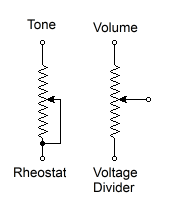There are three main players in the potentiometer game. CTS, Bourns, and Alpha. When I build amplifiers, it is CTS all the way. They have the feel ( a little stiff ) and the sweep that is just perfect for amplifier operation. For guitars, I prefer Bourns. I think Bourns has the best feel for guitar, not too loose and not too stiff while still having a great sweep for guitar use. While Alpha pots do feel decent, I have not had good luck with their sweep being smooth and consistent. By that, I mean that they seem to be notchy or abrupt in their operation as you sweep from 0 to 1 for instance.
Seymour Duncans pots are rebranded Bourns ( which I do believe they state ) and have a custom taper. I have some, I like them. Ernie Ball has their own rebranded pots as well, which I believe are actually CTS made. I have some of those as well and they feel and operate great. So it goes to show that if you have enough money, you can get a pot made however you want by any of the makers. Most OEM pots seem to be Alpha, and I think it's because they do feel great, are relatively cheap, and not too many people operate the full range of their pot, so the sweep may be of little consequence.
I think if you are going to buy a pot for a guitar application, it is best to buy a pot from one of the rebranders such as Seymour D, Ernie Ball, DiMarzio, etc., for one simple reason. They will be a custom taper and feel that is made specifically for the guitar, will likely be CTS or Bourns, and will be the correct type of sweep ( Audio taper as opposed to Linear taper ).
Where I differ from many is that I like custom taper or linear taper pots for my volume controls. It requires a very long sweep to get a small change in volume, allowing you to really fine-tune where you are at for the volume between what would be about 7 to 10 on the dial with an audio taper pot. With linear taper, you have to sweep between about 4 or 5 to 10 to have the same effect. The extra sweep allows you a little more resolution in that range if you manipulate the volume a lot in that area. If you don't really use the volume pot much other than to mute the guitar or for a really subtle volume roll-off to mute the HF content, then a linear taper is probably not your flavor. This is another reason why I like custom taper pots if I can find them the way I like them. They are really nothing but a hybrid between a linear and an audio taper pot. It just gives you a wider sweep in adjustment within a usable volume range.

